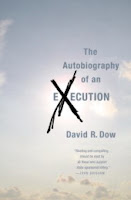4 stars
David Dow is an attorney working in
The client that he mainly focuses on throughout the book is one that he happens to believe is actually innocent. Dow makes it perfectly clear from the beginning that he is aware that almost all of his clients are in fact guilty, however he believes it is still the right thing to do to fight for them to live. But this death row inmate, Henry Quaker (obviously not his real name), was different. Dow explains how over the course of trying to traverse the justice system he comes to believe that Quaker was in fact innocent of murdering his wife and two little children. Instead it looked to be a case of mistaken identity. But the justice system is tricky. Dow explains how the life (and death) of people can be decided basically by the whims of a ticking clock, a sleepy attorney, some incorrectly filed paperwork…some very minor things.
Throughout his fight to get Quaker a stay of execution, Dow leans on his family for support and you can sense his exhaustion through the pages. Not only does he have to deal with this one extremely intense case, but it is only ONE of the many cases he is dealing with at the time. He never seems to get any sort of break. Executions are being scheduled for different clients of his all the time. Other criminals are writing him letters asking him for help because they feel their own lawyers messed up their cases. And he can’t help everyone. But at the same time you can feel the sense of responsibility that must tug at Dow knowing that if he doesn’t at least try something a person will die. Even if that person is a violent horrible murderer.
Whether you are for or against the death penalty I think this is a very interesting and enlightening read. It gives an interesting perspective on things and definitely puts the system under a microscope. Dow admits how difficult it is to do what he does but how it would be even harder not to do it. And he makes the story very engaging along the way. You could feel the sense of urgency in these cases. An execution date would be set and then the lawyers would be running around filing things and I could literally feel myself holding my breath. It was fascinating.
There were a couple incidences in the book where he talked about running into strangers and having to tell them what it was he did for a living. Now, he could have easily talked about the occasions where he has been lectured to about what an awful human being he was for getting convicted rapists and murderers off of death row. That’s actually what I was expecting to happen. But instead he talked about the times he was pleasantly surprised by people that respected what he did. It was actually rather touching, and I think if he went the expected route in his storytelling I would have found it annoying and off-putting.
As a whole the book flowed very easily, even though Dow went off on many a tangents it all made sense with the story he was trying to tell. One thing that took some getting used to was that he did not use any quotation marks when people were talking. But after a bit I settled into that rhythm as well.
Overall it was a deeply touching story and Dow really gave you the sense that, even though he has done this work for so long, this is something he cares greatly about. And he could communicate that very well through his writing. I found myself caring very much about the outcome of Henry Quaker. I was convinced, like Dow, as to the story of innocence Quaker was putting forward. I found myself wanting Quaker to live.
But then again, as Dow stated at towards the end of the book, maybe he did do it.

4 comments:
Fascinating -- I hadn't considered the entanglement of attorney-client privilege in these kinds of non-fiction books but it makes sense that there should still be that privacy. Still, sounds like it was a fascinating read. I had an opportunity to see David Dow a few years ago -- he was v eye-opening.
RE: The Eyre Affair - since you really like Jane Eyre, I think you'll really enjoy The Eyre Affair. I'm not really fond of J.E., which might have slightly lessened my enjoyment of the book.
@Audra, I hadn't either until I read his intro. The book really is fascinating. I'd definitely recommend it!
@Sarah, okay great thanks. Might put it on the TBR...
Wow, sounds like a very interesting read. I can't imagine - the possibility of innocence or guilt is always there...either way.
Post a Comment